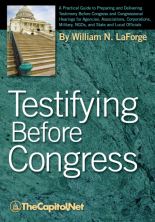I’ve been wondering why the Washington Post spent two years putting together the story that it rolled out this week — “Top Secret America.” The report essentially covers the world of classified contracting, and it was delivered with the fanfare that the Post usually reserves for a Woodward exclusive or a big, deep scandal.
. . .So, at the end of the day, what value does that big database have for Post readers? As the stories make clear, the database didn’t actually turn up any scandal or issue that couldn’t have been reported without the database. And reading the database is uninformative, pretty as some of the tools are. I’m more motivated than most, and I couldn’t bring myself to spend more than an hour browsing through it. Other than their connection to classified research, the data actually supplied about companies and agencies is strikingly thin.
If there’s no big story to write, and the database puts readers to sleep, why did the Post spend scarce resources on these things at a time when newspapers are in desperate shape?
Top Secret Trailer – 1984
Here’s a theory: if the Post is looking for new sources of ad revenue, it may think that maintaining the best web resource on the classified sector of government spending will allow it to target classified-contracting companies for advertising. It can aim advertising at them (“We can clean your SCIF cheaper than anyone else – outsource that job to our cleared maintenance workers!”). And it can seek ads from them (“Tell Congress to preserve TSA’s crucial Classified Border Control Research Program!”). Plus, while there aren’t a lot of business sectors that the Post can cover better than the Wall Street Journal or the New York Times, this government-driven sector could be one.
For purposes of both coverage and advertising, then, the series may be an Washington Post exercise in market segmentation. Which would make this series the journalistic equivalent of a dog marking its territory.
“Top Secret America” — what was the Washington Post thinking?, by Stewart Baker, The Volokh Conspiracy, July 24, 2010
Other reactions:
- “Blah.” cryptogon.com, July 19th, 2010
- “Seems to be a lot of hype.” , July 19, 2010
- “The Washington Post didn’t really tell us anything new.” Joshua Foust, Columbia Journalism Review, July 22, 2010
- “what’s funny is that there is nothing here you can’t see openly at any clearance-themed job fair. this is a whole big bunch of nothing.” comment by leeanthonyva on WaPo blog, July 19, 2010 12:16 PM
Image by Dan Diemer, used under its Creative Commons license.
More
- Defense Intelligence Agency (DIA)
- Information Security Oversight Office (ISOO)
- US Intelligence and Security Agencies
- United States Faces Challenges in Addressing Global Cybersecurity and Governance, GAO Report GAO-10-606, July 2, 2010
- National Security: Key Challenges and Solutions to Strengthen Interagency Collaboration, GAO Report GAO-10-822T, June 9, 2010
- National Security Letters in Foreign Intelligence Investigations: Legal Background and Recent Amendments, CRS Report RL33320 (49-page PDF
 )
) - Intelligence Issues for Congress, CRS Report RL33539 (35-page PDF
 )
) - National Security Whistleblowers, CRS Report RL33215 (53-page PDF
 )
) - “Gang of Four” Congressional Intelligence Notifications, CRS Report R40698 (14-page PDF
 )
) - Congress as a Consumer of Intelligence Information, CRS Report R40136 (17-page PDF
 )
) - Congressional Oversight of Intelligence: Current Structure and Alternatives, CRS Report RL32525 (47-page PDF
 )
) - Sensitive Covert Action Notifications: Oversight Options for Congress, CRS Report R40691 (14-page PDF
 )
) - Intelligence, Surveillance, and Reconnaissance (ISR) Acquisition: Issues for Congress, CRS Report R41284 (32-page PDF
 )
) - Covert Action: Legislative Background and Possible Policy Questions, CRS Report RL33715 (17-page PDF
 )
)
Courses
- Congressional Operations Briefing – Capitol Hill Workshop
- Drafting Federal Legislation and Amendments
- Writing for Government and Business: Critical Thinking and Writing
- Custom, On-Site Training
- Preparing and Delivering Congressional Testimony and Oral Presentations, a Five-Course series on CD
- Congress, the Legislative Process, and the Fundamentals of Lawmaking Series, a Nine-Course series on CD
Publications

Testifying Before Congress

Pocket Constitution

Citizen’s Handbook to Influencing Elected Officials: A Guide for Citizen Lobbyists and Grassroots Advocates

Congressional Procedure
CongressionalGlossary.com, from TheCapitol.Net
For more than 40 years, TheCapitol.Net and its predecessor, Congressional Quarterly Executive Conferences, have been teaching professionals from government, military, business, and NGOs about the dynamics and operations of the legislative and executive branches and how to work with them.
Our custom on-site and online training, publications, and audio courses include congressional operations, legislative and budget process, communication and advocacy, media and public relations, testifying before Congress, research skills, legislative drafting, critical thinking and writing, and more.
TheCapitol.Net is on the GSA Schedule, MAS, for custom on-site and online training. GSA Contract GS02F0192X
TheCapitol.Net is now owned by the Sunwater Institute.
Teaching how Washington and Congress work ™


